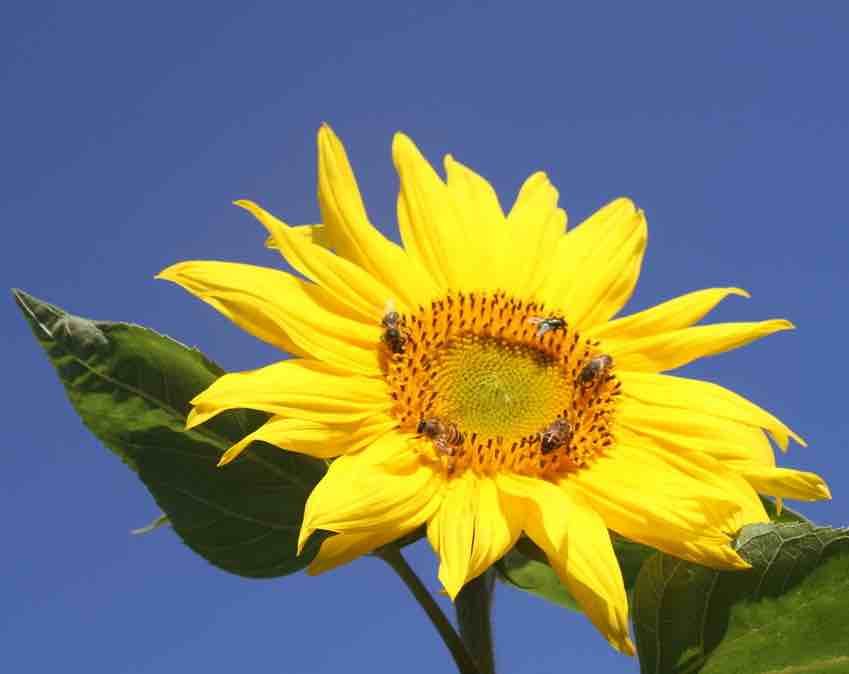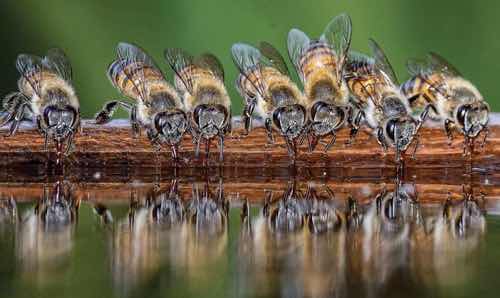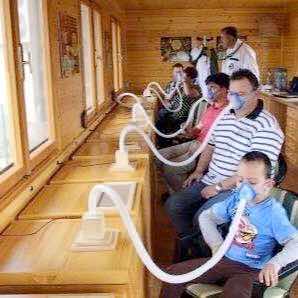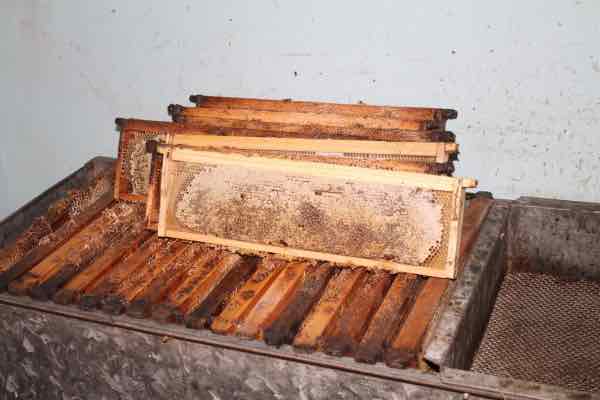- Bernard Preston homepage
- Our natural honey
- Bees Show That Social Interaction Can Heal the Brain
Bees show that social interaction can heal the brain
Bees show that social interaction can heal the brain; loneliness whilst foraging ages their minds.
A honeybee lives about six weeks depending on the season and various factors. In the summer they work much harder having to forage, going out alone in search of flowers and sometimes water. They meet up with family from the same hive or other colonies but most often it's a lonely world.
In the early stages of a bee's life she is busy in the hive. Perhaps she is feeding the queen, building new comb or helping guard the colony. These are social activities with her fellows all about her.
Then at about two to three weeks after hatching the honeybee becomes a forager; this means leaving the hive for long periods. Much of the time she will be out collecting nectar and pollen, working on her own.

Deterioration of the brain
Scientists have found that when the honeybee becomes a worker, going out to forage on her own and isolated from her sisters for long periods, her brain actually ages faster. Despite all the varied experiences of visiting exciting places, finding fragrant flowers and certainly encountering new challenges her mind begins to show early signs of dementia. Soon she will die; at about six weeks old.
Reintegration with her family

But these scientists have found that if these workers are then forcibly made to stay in the hive, say by inclement weather, their brains snap right back. They can remember new things again, an ability that was lost when they became foragers.
It is often assumed that deterioration of the mind is something quite beyond our control; or perhaps was determined by an unhealthy lifestyle and the opportunity is now long lost. But these scientists have revealed that bees prove that social interaction can heal the brain in ways not formerly understood; and that this is perhaps pertinent to us too.
Breathing air from beehives
In Slovenia there is a very odd practice, or so we might think; they breathe in air from beehives. They believe that it's good for their health.
 Breathing air from beehives.
Breathing air from beehives.It has long been suggested that 'keepers enjoy longer and healthier lives; they suffer from far less cancer, for example, particularly of the lungs. Is it from the air they breathe, the natural honey they enjoy or even the bee-stings that go with the hobby? Or some other factor we never have considered perhaps may come into the equation. Eventually science will distinguish between fact and fiction.
Breast cancer
Australians scientists are experimenting with great success using bee venom to treat malignant breast tumours[3]; with none of the side effects of modern chemotherapy. The next question to be researched is whether 'keepers specifically suffer from fewer neoplasms of the female organs compared to other women.
Prevention remains queen of the road. Just one helping daily of a true whole grain gives almost 50% protection against malignant tumours of the breast and prostate; but you are most unlikely to find them on typical grocery store shelves.
- Mediterranean diet does not go far enough to prevent breast cancer
- Lignans in whole grains and seeds protect the prostate gland
Longevity
Scientists from the Berlin Cancer Institute in Germany report they have never encountered a beekeeper who died from a neoplasm.
There is a claim that a French study found that only one in a thousand beekeepers died of cancer but no reference can be found; it's probably fake news.
It's long been believed that longevity is the keyword with beekeeping. Or is it the honey, the pollen[2] or the social interaction that protects them from chronic disease?
The ancient Egyptians portrayed bee pollen as "life-giving dust." It is in fact a mixture of that from the flower together with honey and secretions from the mouth of the insect.
There is nothing in the world that could beat honey as an aid to defying old age. Keep bees and eat the nectar of the gods if you want to live long.
Beekeepers live longer than anybody else.
- Prof John Anderson, University of Aberdeen, Scotland
Or could it even be the stings that every beekeeper experiences periodically?
An absorbing hobby
Most likely it's for none of these reasons that most beekeepers got started with a hive or two in the garden. More probably it had to do with the fact that unadulterated honey was becoming increasingly difficult to find; and today is certainly going to be very expensive.
Just as bad is that commercial bottlers ruin good honey by heating it and straining out all the pollen; it is most likely little less detrimental than sugar as a sweetener.
An esteemed researcher came to this conclusion; Campbell's twenty year diabetes rule.
Nobody has yet contradicted his findings. Consuming 20 teaspoons of sugar per day for two decades is a certain cause of type-2 diabetes; and much sooner if a person is also eating highly refined glycaemic starch. Just one slice of chocolate cake has over 50g of net carbs.
Yet German researchers have found that the natural unprocessed nectar from the hive has a low glycaemic index; it has much less of an effect on blood glucose than sugar or the commonly available commercial honey[1].
 The real stuff
The real stuffMost 'keepers meet regularly with fellow enthusiasts, sharing ideas and delving into their hives. Not only do they benefit from all of the blessings associated with true natural honey but unwittingly they are confirming what the bees have shown us; social interaction can heal the brain and prevent early dementia.
How to start beekeeping
There are sound reasons why most folk are hesitant to start beekeeping; the stings are painful and it's fairly hard physical work. Very often it is the fact that an average hive will produce 50 or more pounds of magnificent, unprocessed honey in a good year that gets them interested.
Potentially it is also a very lucrative business. That honey from just one hive would retail for five hundred dollars or more each year; with small overheads. That is double the cost of the box.
How many jobs are there where you can double your capital in the first year? However let's be honest; like any other work it takes time and an inquiring mind to acquire the knowledge and skills that make a competent beekeeper.
Bees show that social interaction can heal the brain
Bees show that social interaction can heal the brain; and that social isolation leads to early dementia.
When browsing use right click and "Open Link in New Tab" or you may get a bad gateway signal.
Newsletter
Our newsletter is entitled "create a cyan zone" at your home, preserving both yourself and Mother Earth for future generations; and the family too, of course. We promise not to spam you with daily emails promoting various products. You may get an occasional nudge to buy one of my books.
Here are the back issues.
- Lifestyle and ideal body weight
- What are ultra-processed foods?
- Investing in long-term health
- Diseases from plastic exposure
- Intensive lifestyle management for obesity has limited value
- A world largely devoid of Parkinson's Disease
- The impact of friendly bacteria in the tum on the prevention of cancer
- There's a hole in the bucket
- Everyone is talking about weight loss drugs
- Pull the sweet tooth
- If you suffer from heartburn plant a susu
- Refined maize meal and stunting
- Should agriculture and industry get priority for water and electricity?
- Nature is calling
- Mill your own flour
- Bake your own sourdough bread
- Microplastics from our water
- Alternative types of water storage
- Wear your clothes out
- Comfort foods
- Create a bee-friendly environment
- Go to bed slightly hungry
- Keep bees
- Blue zone folk are religious
- Reduce plastic waste
- Family is important
- What can go in compost?
- Grow broad beans for longevity
- Harvest and store sunshine
- Blue zone exercise
- Harvest and store your rainwater
- Create a cyan zone at your home
Did you find this page interesting? How about forwarding it to a friendly book or food junkie? Better still, a social media tick would help.
- Bernard Preston homepage
- Our natural honey
- Bees Show That Social Interaction Can Heal the Brain
Address:
56 Groenekloof Rd,
Hilton, KZN
South Africa
Website:
https://www.bernard-preston.com